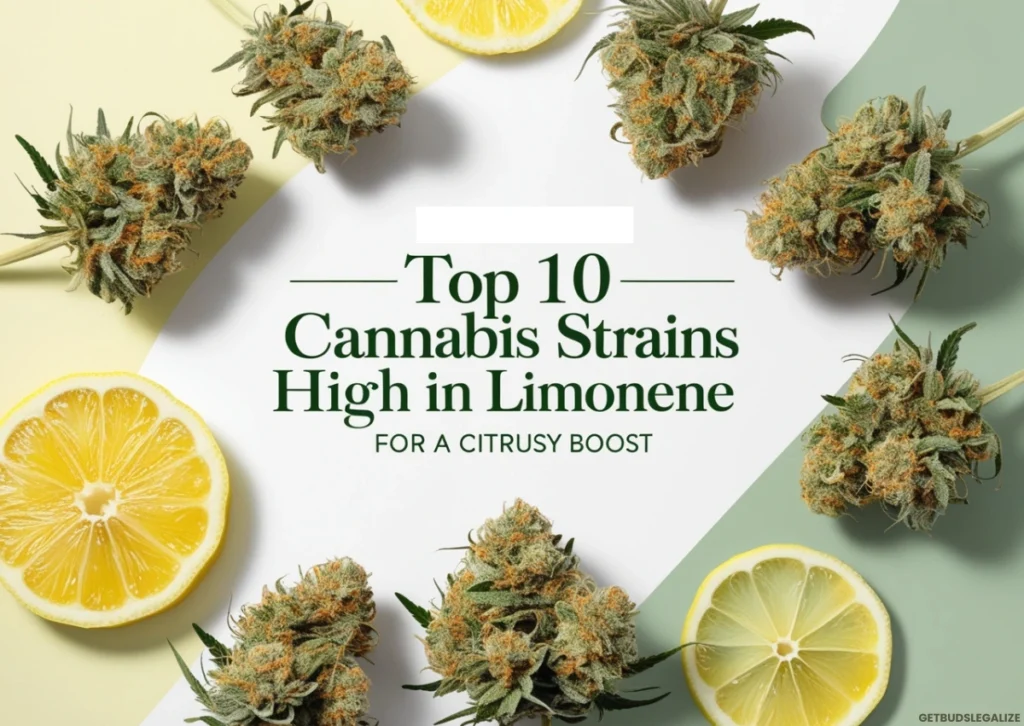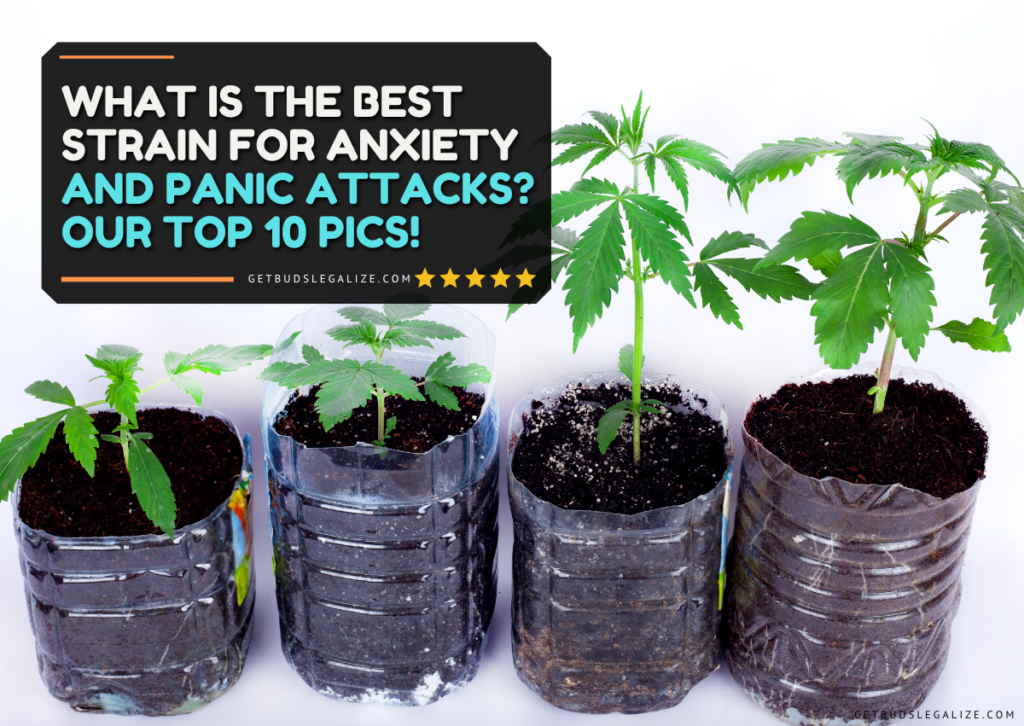Top 10 Best Cannabis Strains for Depression and Anxiety You Can Choose From! A Comprehensive Guide
Depression is a pervasive mental health issue affecting millions of individuals worldwide. Traditional treatments, such as therapy and medications, may not provide the desired relief for some. As a result, many people are turning to cannabis as a potential alternative or complement to their existing treatment plans.
In this guide, we will explore the Best Cannabis Strains for Depression and Anxiety relief, highlighting ten strains known for their mood-enhancing properties, backed by personal experiences and expert insights.
Understanding Cannabis and Depression
Cannabis contains over 150 compounds known as cannabinoids, with THC (tetrahydrocannabinol) and CBD (cannabidiol) being the most studied. THC is known for its psychoactive effects, while CBD is non-intoxicating and has gained popularity for its potential therapeutic benefits.
Different strains can have varying effects based on their cannabinoid and terpene profiles, making it essential to choose the right one for your needs, especially if you’re seeking relief from depression symptoms.
The Role of Terpenes
Terpenes are fragrant compounds present in cannabis that significantly influence a strain’s flavor and aroma. In addition to their sensory qualities, terpenes are essential in determining the effects of different strains. For example, myrcene is known for its relaxing properties, while limonene is associated with mood elevation.
By understanding the terpene profile of a strain, you can select one that aligns with your desired effects, especially when seeking relief from symptoms of depression.
Top 10 Best Medical Cannabis Strains for Depression and Anxiety
1. Jack Herer: The Legend of Energizing Clarity

Description:
A sativa-dominant strain named after the legendary cannabis advocate, Jack Herer is famed for its uplifting, clear-headed effects. Known for its earthy pine aroma, this strain combines a high THC level (18-20%) with a low CBD content (0.03-0.2%) and boasts terpinolene, a terpene associated with anti-inflammatory and antidepressant properties. Ideal for combating fatigue, apathy, and low motivation, Jack Herer delivers a boost in creativity and focus.
User Experience: Many users report an immediate uplift in mood and motivation. It’s highly regarded for sparking creativity and energy without overwhelming the mind, making it a go-to for daytime relief from low moods.
- Genetics: Haze x Shiva Skunk x Northern Lights #5
- Variety: Sativa 60% Indica 40%
- THC content: Up to 20%
- CBD: 0.05% to 0.2%
- CBG: 1%
- Taste & Smell: Sweet, citrus, tropical fruit notes with an earthy, pine, peppery finish.
- Effect: Energetic Buzz, Euphoric High, Balanced Body Relaxation
- Medical applications: Stress, depression, fatigue, pain, Headaches
2. Green Crack: A Burst of Citrus Energy

Description:
Green Crack is a sativa-dominant strain with a vibrant citrus aroma and high levels of caryophyllene, which modulates THC’s effects to ease anxiety and depression. With THC levels ranging from 13-21% and CBD at around 0.1%, Green Crack is renowned for its stimulating, mood-enhancing properties that chase away stress and pessimism.
User Experience: Users love Green Crack for its energizing effect, describing it as a “caffeine-free” pick-me-up. It’s praised for quickly improving mood and reducing stress, ideal for busy days when a sense of focus and motivation is needed.
- Genetics: Skunk #1 x Sweet Leaf Indica
- Variety: Sativa 75% Indica 25%
- THC: 13% to 21%
- CBD: 0.10%
- CBG: 1%
- Taste & Smell: Citrus, mango, earthy, sweet, pine, fruity
- Effect: Energetic, happy, uplifted, focused, euphoric
- Medical uses: Stress, depression, fatigue, pain, lack of appetite
3. Blue Dream: Blissful Relaxation with Sweet Berry Notes

Description:
Combining Blueberry and Super Silver Haze, this hybrid strain provides a smooth balance of euphoria and relaxation. With THC levels between 17-24% and a hint of CBD (0.1-0.2%), Blue Dream offers a mild berry aroma and β-pinene, which has anti-inflammatory benefits. It’s often sought out for alleviating symptoms of depression, insomnia, and chronic pain.
User Experience: Users report feeling a gentle, full-body relaxation paired with mental clarity, describing it as ideal for evening use without making them overly sleepy.
- Brand/Breeder: ILGM
- Genetics: Blueberry indica X Super Silver Haze
- Variety: Sativa 80% Indica 20%
- THC: Up to 21%
- CBD: Up to 2%
- Taste & Smell: Sweet berry, Blueberry, Mango, Herbal, Earthy, and Vanilla
- Effect: Euphoric, Relaxed, Happy, Euphoric, Uplifted, Creative
- Medical uses: Stress, Depression, Pain
4. Sour Diesel: Pure Motivation with a Diesel Kick

Description:
A sativa-dominant powerhouse, Sour Diesel combines Chemdawg and Super Skunk genetics to bring a potent, uplifting high. With THC around 19-22% and low CBD, it boasts limonene, known for its mood-boosting properties. This strain is celebrated for its pungent diesel aroma and its ability to enhance focus and motivation, especially during stressful times.
User Experience: Known for its long-lasting effects, users describe Sour Diesel as an “instant mood booster.” Many rely on it to start the day on a positive note, noting it helps clear mental fog and boost productivity.
- Genetics: Super Skunk X Chemdawg 91
- Variety: Sativa 70% Indica 30%
- THC: 22%
- CBD: 0.20%
- Taste & Smell: Diesel, sour, earthy, pungent, lemon, herbal
- Effect: Happy, Relaxed, Uplifted, Euphoric, Energetic
- Medical uses: Chronic Pain, Stress, Depression
- Prize winner
5. OG Kush: The Ultimate Classic for Deep Relaxation

Description:
An Indica-dominant strain with high THC levels (19-26%) and minimal CBD, OG Kush combines Chemdawg and Old World Paki Kush genetics. With a robust earthy aroma, this strain features d-limonene, which supports anti-anxiety and relaxation effects. Perfect for easing into restful states, OG Kush is ideal for unwinding after a long day.
User Experience: Users find OG Kush immensely calming, reporting relief from anxiety and stress. Many love it for evening use, as it tends to help with sleep issues without a heavy sedative effect.
- Genetics: Chemdawg x Old World Paki Kush
- Variety: 75% indica 25% sativa
- THC: 19% to 26%
- CBD: 0.30%
- Taste & Smell: Lemon, Sour, Earthy, Pine, Spicy, Herbal, Woody
- Effect: Happy, euphoric, relaxed, uplifted, hungry
- Medical uses: Stress, pain, depression, insomnia, headaches
6. Pineapple Express: Tropically Uplifting and Fruity

Description:
A hybrid strain that merges Trainwreck and Hawaiian, Pineapple Express has a tropical, fruity scent and balanced, joyful effects. With THC levels around 19-25% and trace CBD, its high levels of caryophyllene offer anti-inflammatory benefits. It’s loved for enhancing mood and combating daily stress.
User Experience: Known for its cheerful and balanced high, Pineapple Express is described by users as “happy and light-hearted.” Many find it helpful for staying positive during busy days or creative sessions.
- Genetics: Trainwreck x Hawaiian
- Variety: Sativa 40% Indica 60%
- THC Levels: 19% to 25%
- CBD: 1%
- Taste & Smell: Pineapple, sweet, tropical, pine, earthy, mango
- Effect: Happy, Relaxed, Uplifted, Euphoric, Energetic
- Medical uses: Chronic Pain, Stress, Depression, Fatigue, Lack of appetite
7. Northern Lights: Legendary Calm and Full-Body Relaxation

Description:
This indica strain descends from Afghani and Thai genetics and is known for its deep relaxation and soothing, earthy aroma. With THC levels of 16-18%, Northern Lights contains caryophyllene, which provides analgesic benefits. It’s a top choice for easing depression, anxiety, and sleep issues.
User Experience: Users frequently praise Northern Lights for its ability to calm the body and mind without excessive sedation. Many report improved sleep and relief from chronic stress.
- Genetics: Afghani Indica x Thai Sativa
- Variety: 10% Sativa 90% Indica
- THC: 18%
- CBD: 0.10%
- CBG: 1%
- Taste & Smell: Earthy, sweet, pine, spicy, lemon, skunk
- Effect: Relaxed, happy, euphoric, sleepy, uplifted
- Medical uses: Stress, pain, insomnia, depression, lack of appetite
8. Super Lemon Haze: Zesty Uplift for Creative Minds
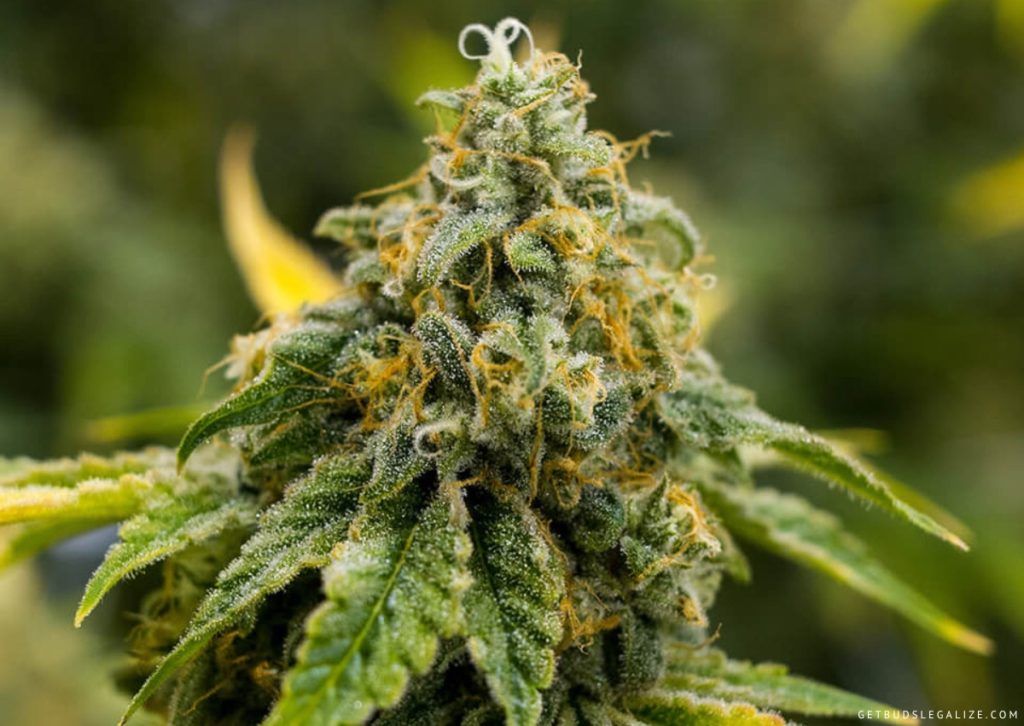
Description:
A Sativa-dominant blend of Lemon Skunk and Super Silver Haze, Super Lemon Haze features a THC content of 15-22% and a limonene-rich terpene profile for anti-anxiety effects. Known for its vibrant lemon aroma, it’s a favorite for mental clarity and creative stimulation.
User Experience: Users often describe Super Lemon Haze as “energetic and happy,” making it ideal for tackling tasks with a creative edge. It’s appreciated for reducing mental stress without a foggy high.
- Genetics: Lemon Skunk x Super Silver Haze
- Variety: Sativa 80% Indica 20%
- THC Levels: 15% to 22%
- CBD: 0 to 0.1%
- Taste & Smell: Lemon, earthy, lemon, spicy, sweet, candy, tangy
- Effect: Happy, Energetic, Uplifted, Euphoric, Creative
- Medical uses: Chronic Pain, Stress, Depression, Fatigue, Headaches
9. Blackberry Kush: Sweet Berry Relaxation for Stress Relief
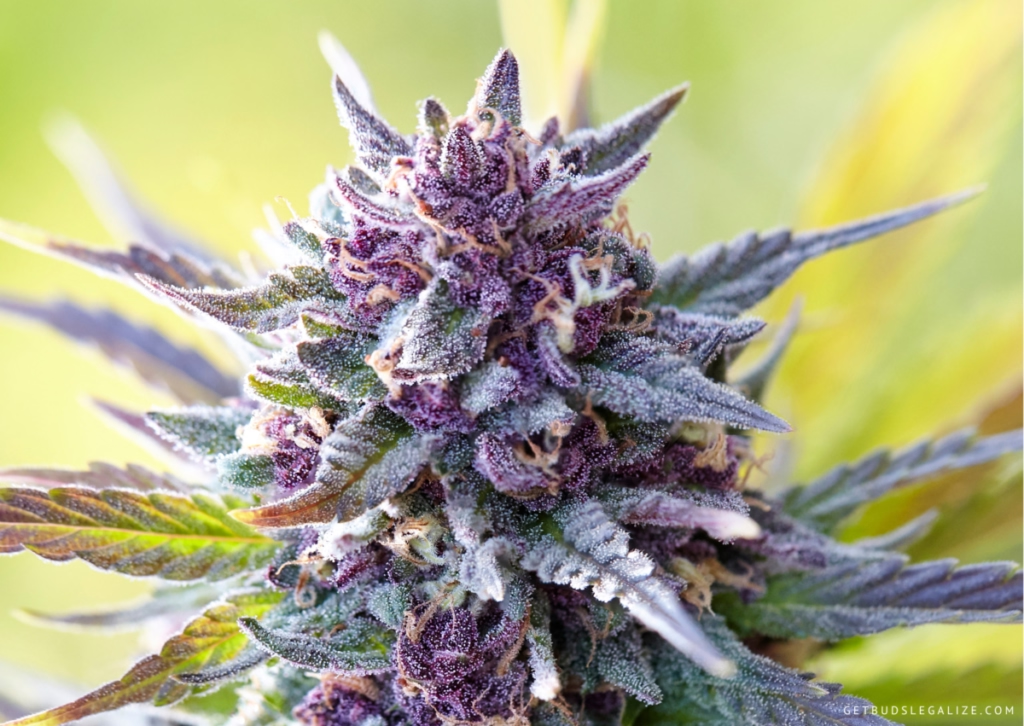
Description:
An indica hybrid combining Blackberry and Afghani, Blackberry Kush has THC levels around 16-20% and a rich berry flavor, with high myrcene content for soothing effects. This strain is favored for relieving stress and promoting relaxation, especially in the evening.
User Experience: Users rave about the soothing effects of Blackberry Kush, describing it as perfect for winding down. It’s frequently used to alleviate anxiety and physical discomfort before bed.
- Genetics: Afghani x Blackberry
- Variety: Sativa 20% Indica 80%
- THC content: 16% to 20%
- CBD: 0.50%
- CBN: 2%
- Taste & Smell: Earthy, blackberry, sweet, diesel, spice
- Effect: Relaxed, happy, sleepy, euphoric, uplifted
- Medical applications: Stress, pain, insomnia, lack of appetite, depression
10. Granddaddy Purple: Grapey Tranquility for Restful Nights
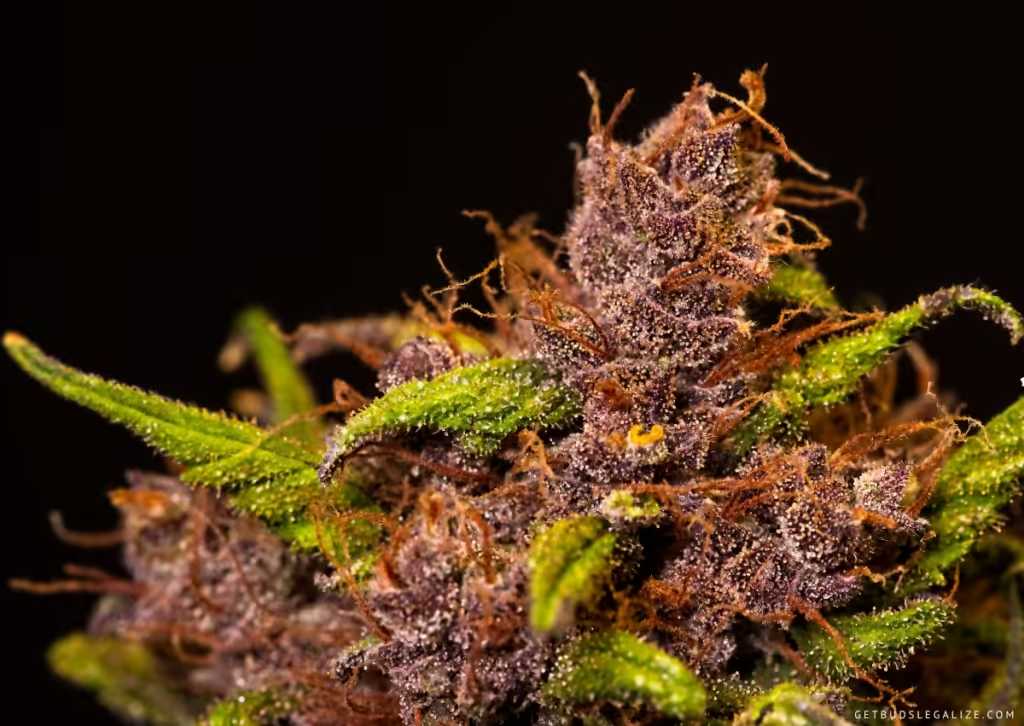
Description:
An Indica-dominant strain that crosses Purple Urkle and Big Bud, Granddaddy Purple has THC levels of 17-23% and a calming, grape-like aroma. With high myrcene levels, this strain provides deep relaxation and pain relief, ideal for sleep support.
User Experience: Loved for its gentle, sleep-inducing effects, users report Granddaddy Purple as highly effective for reducing anxiety and physical tension. It’s often the go-to for those seeking peaceful rest and mood relief.
- Genetics: Purple Urkle x Big Bud
- Variety: 100% Indica
- THC: Up to 23%
- CBD: Low
- Taste & Smell: Sweet, berry, fruity, grape
- Effect: Relaxed, euphoric, happy, sleepy, hungry
- Medical uses: Stress, anxiety, pain, insomnia, depression, lack of appetite
How Should I Consume Medical Marijuana Safely for My Depression or Anxiety Relief
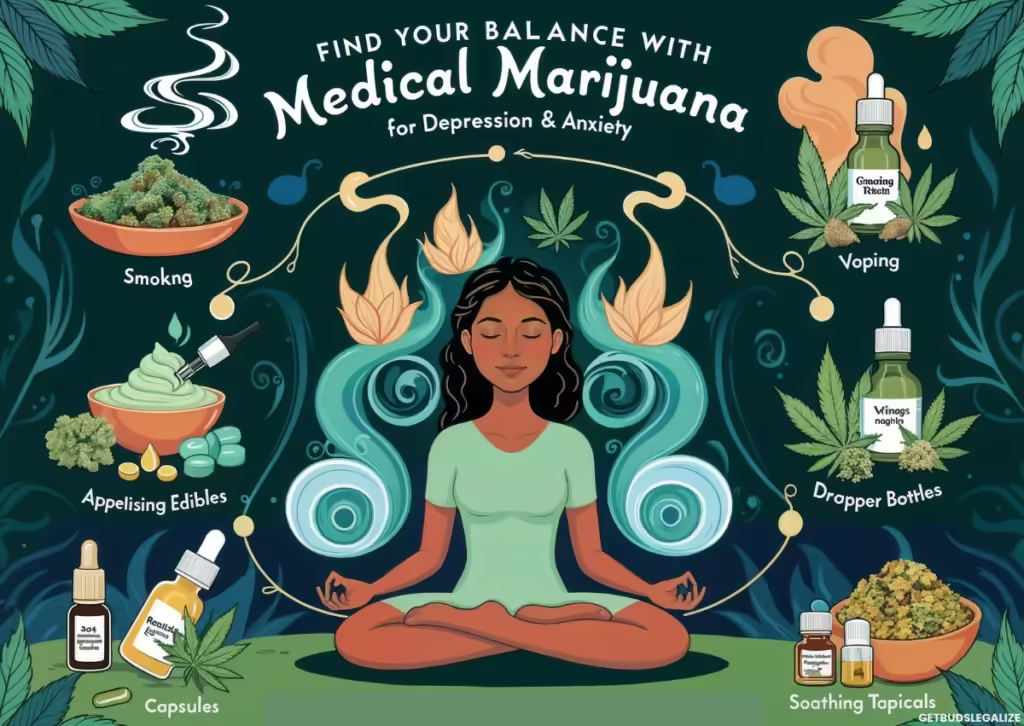
Medical marijuana offers various methods of consumption, including smoking, vaping, edibles, oils, tinctures, capsules, and topicals. Each option has its own onset time, duration, potency, dosage control, and health implications, making it essential to choose the right approach for your needs.
Here are some guidelines to help you consume medical marijuana safely for managing depression or anxiety:
- Start low and go slow: Begin with a low dose of cannabis and wait for the effects to kick in before taking more. This can help you avoid overconsumption, adverse reactions, and tolerance buildup.
- Use cannabis as an adjunct therapy: Cannabis is not a cure for depression. It can only provide temporary relief from some symptoms. You should also seek other forms of treatment, such as psychotherapy, medication, exercise, meditation, and social support.
- Choose the right strain: As we mentioned above, different strains have different effects on your mood and mental state. Try to choose a strain that suits your needs, goals, and symptoms.
- Avoid mixing cannabis with alcohol or other drugs: This can increase the risk of negative effects, such as impaired judgment, memory loss, anxiety, paranoia, and psychosis.
- Consult your doctor: If you are taking any medications or have any medical conditions, talk to your doctor before using cannabis. Some drugs may interact with cannabis and cause unwanted side effects or reduce their effectiveness.
- Monitor your mood: Keep track of how cannabis affects your mood, thoughts, and behaviors. If you notice any negative changes or worsening of your depression, stop using cannabis and seek professional help.
Conclusion
Selecting the best cannabis strains for depression and anxiety relief is a highly personal journey, as each individual may respond differently. While the strains mentioned above have shown promise in alleviating depressive symptoms, it’s essential to start mindfully, beginning with low doses and adjusting as needed. Consulting a healthcare professional can provide valuable guidance if you’re considering cannabis as part of your mental health approach.
Note on Legality and Safety
Before using or purchasing cannabis, ensure you are aware of its legal status in your area. It’s also crucial to consider potential interactions with other medications or health conditions. Prioritizing responsible and informed consumption can help foster a positive and beneficial experience with cannabis for mental health support.
FAQs about Best Cannabis Strains for Depression and Anxiety Relief
Cannabis is typically categorized into two main types: indica and sativa. Indicas generally have higher levels of THC and lower levels of CBD, making them more relaxing and sedative, ideal for managing insomnia and chronic pain. Conversely, sativa strains usually have lower THC and higher CBD levels, providing uplifting and energizing effects, which can enhance mood and creativity.
For individuals seeking relief from depression, choosing between indica and sativa often depends on personal preferences and symptoms. Indicas may alleviate anxiety and insomnia but could exacerbate feelings of low mood or fatigue in some users. Sativas might boost mood and focus but can also trigger anxiety or paranoia.
Hybrid strains, which combine elements of both indica and sativa, may also be beneficial, allowing users to tailor their experience based on specific needs. Ultimately, it’s crucial to experiment responsibly and consult with a healthcare provider to determine the best option for you.
The debate over whether THC or CBD is more effective for treat depression is ongoing. THC activates the CB1 receptors in the brain, which can enhance feelings of pleasure and mood. However, it may also impair cognitive functions and increase anxiety in some individuals, potentially worsening symptoms of depression.
On the other hand, CBD interacts differently, often enhancing serotonin levels and promoting neurogenesis and neuroplasticity, which can lead to longer-lasting mood improvements. Many find that a balanced approach, utilizing both cannabinoids, can provide a comprehensive therapeutic effect while minimizing potential negative side effects. This is especially relevant for those exploring different weed strains for depression treatment.
When seeking the top strains for mood disorders, consider varieties known for their uplifting effects, such as Blackberry Kush, which combines relaxing indica effects with a hint of euphoria, or Durban Poison, which is renowned for its energizing qualities. Other strains like Granddaddy Purple can enhance relaxation and happyness, making them favorable for those struggling with depressive symptoms.
Indica strains are often recommended for managing symptoms of depression and anxiety due to their relaxing effects. They can provide significant relief for those suffering from insomnia and chronic stress. However, users should be cautious, as some may experience increased feelings of lethargy or sadness. It’s vital to find a strain that balances relaxation without overwhelming sedation.
While sativa strains can help boost mood and energy, they are not universally recommended for anxiety and depression. Some individuals may find that the stimulating effects of sativa exacerbate anxiety, particularly in high doses. Strains with a higher CBD content may offer a better balance, providing the uplifting effects of Sativa while reducing anxiety risks.
Terpenes, the aromatic compounds found in cannabis, can influence how the body responds to different strains. For depression relief, myrcene is known for its relaxing properties, while limonene can elevate mood and reduce stress. Other beneficial terpenes include caryophyllene, which may have anti-anxiety effects, and linalool, known for its calming properties. Selecting strains with these terpenes may enhance the therapeutic effects of cannabis for mood disorders.
Yes, combining natural remedies with cannabis can create a more holistic approach to managing depression. Options like St. John’s Wort, omega-3 fatty acids, saffron, exercise, meditation, and yoga can support mood improvement and overall mental health. These remedies can work synergistically with marijuana strains to enhance their effects or provide alternative relief.
While cannabis can provide relief for many individuals, it is essential to approach its use cautiously. Potential risks include increased anxiety, dependence, and exacerbation of existing mental health conditions in some users. It is crucial to consult with a healthcare professional before incorporating cannabis into your depression treatment plan, especially if you are taking other medications.
When selecting cannabis strains for depression, consider the THC and CBD content, the strain type (indica, sativa, or hybrid), and the terpene profile. Aim for strains known for uplifting effects, and pay attention to personal reactions, as individual experiences can vary significantly. Keep in mind your symptoms and how cannabis affects your overall well-being.
ILGM Fertilizer
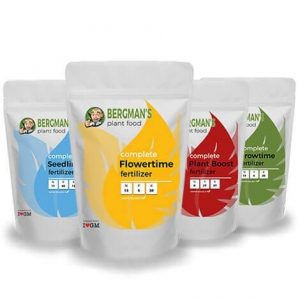
Ultimate Marijuana Fertilizer
Nourish your plants from seedling to harvest with our premium formula!
- Enough for 5+ Plants: Perfect for your growing needs.
- Exclusive Discount Package: Save more while you grow!
- Versatile Use: Ideal for soil, hydroponics, and all growing mediums.
- Optimal Plant Health: The best way to ensure robust growth and thriving yields.
ILGM Plant Protector
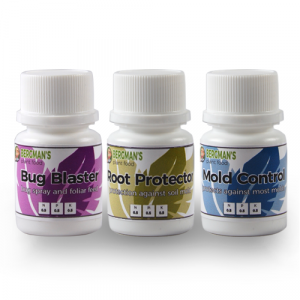
Ultimate Plant Protection for Your Cannabis
Safeguard your plants from diseases and harmful pests with our effective formula!
- Comprehensive Protection: Keep your cannabis healthy and thriving.
- Three 20 ml Bottles: Sufficient supply for up to 20 plants.
- Versatile Application: Perfect for soil, hydroponics, and all growing mediums.
- Peace of Mind: Ensure a healthy garden with our trusted protector.













